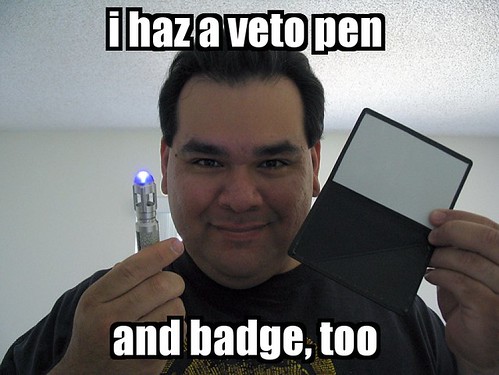Everything I know about security, I learned from Ghostbusters…
Posted February 17th, 2009 by Vlad the Impaler(Well maybe not everything…)
I’ve been the defacto security officer at a government agency going on two years now; it’s been quite a challenge. Without getting too deeply into how this happened (since I’m a contractor), I’d like to share some of the insights, horror stories, tips, and interesting anecdotes I’ve gathered over the past 22+ months.
If nothing else, many of my “preconceived notions” about managing an effective security program at a federal agency have been confirmed. Many others have been changed in ways I would never have suspected. I’m going to attempt to explain these in what I hope is an insightful, if not humorous way.
Ghostbusters works for me… At the time (1984), it was, hands-down, the funniest movie I had ever seen–it left its mark. It sure beats “Dude Where’s My Car?” for quotes that can be applied to security. But then some may say I’ve either set the bar a bit low, or I need to expand my movie viewing habits. Hey, work with me on this one people!!!
So, here are several quotes from the movie and their application to my philosophy on information security. I hope you enjoy it!

Ecto-1 photo by chad davis.
I’m from security, and I’m ready to believe you.
Listen. Foster discussion. Then, draw upon your experience and make your decision. Do not enter into a discussion with a mandate (unless from above). Mandates do not foster discussions, especially in areas where policy is absent or maybe not-so-explicit. Most importantly, this is an invitation for the person you’re talking to begin their side of their story.
Important Safety Tip: As the security professional, remember – this is the time for you to begin listening!
“Next time, if <someone> asks whether you’re a GOD, you say YES!”
Face it. Many of us security folks are humble. We all may even know what it is we don’t know. We might be a little gun-shy in our first few weeks on the job. However, don’t let your humility or shyness overcome you…
Like it or not, you are your organization’s security expert. “The Shell Answer Man,” the “Pro from Dover,” the “Go-to Guy/Gal.” While you may not have committed the processes contained within the IKE negotiation phases to memory, and may not be able to quote RFC 3514 off the top of your head, you probably DO know where to find the information… “I don’t know,” should never roll off your lips.
When you’re hired as the subject matter expert on security, you need to be confident–whether you’re knocking a soft-toss out of the park, but especially when you tell folks that you’ll research the topic and get back to them. Come back with the facts, and your credibility will be strengthened.
Likewise, when you have reservations about a particular situation, let folks know why you’re not jumping on board their crazy train. Invite discussion. State your case plainly and propose solutions, or if you can’t suggest an alternative, discuss it offline in another meeting focused on solutions. While your mission is to guard the organization’s interests, you can’t do so at the expense of the organization’s mission. Working closely with client service or engineering teams shows that security can be an integral part of solution development, and not an impediment. Think of this as guiding others to the solution – without telling them the “right” answer. This allows others to “own” the solution – their help may be valuable, if not necessary to help you socialize a potentially contentious (or expensive) solution.
“Don’t cross the streams…”
I love this one. I get to use this at least twice a day while speaking to engineering, operations, management or other folks at my agency. It’s gotten so that people have heard it so many times, they’re using it. Best part is, they are using the phrase correctly!
So what does this mean exactly? Generally/normally, the following things should never be directly connected to one another:
- Classified and Unclassified Networks
- The Internet and a Classified Network
- Networks classified at different levels
- Development, Test, and Production Networks/Environments
- Accredited/trusted networks / less trusted
- Management and Production Networks
“Wait! I thought you said crossing the streams was BAD?!”
So, what does this Ghostbusters quote mean to we security folk?
Every policy, however rigidly enforced, needs a waiver process.
So what do I really mean? When you understand and can quantify the risk of a particular practice or a particular action, you can develop compensating controls to make otherwise unthinkable practices (e.g., connecting unclassified networks to classified networks) less risky. In this example, it can be done using one-way guard technology, or some other similar trusted, manual process.
Face it, jumping off a bridge can be dangerous, if not suicidal. However, when the jumper attaches themselves to a bungee cord or uses a parasail, the act of jumping off a bridge can be reduced from a Darwin-qualifying stunt to thrilling fun or awesome opening movie scene (like the opening of the first XXX movie starring Vin Diesel as Xander Cage). It may not be for everyone – but, given the right safety equipment, some of us might even consider taking the leap.
There’s an even better example. Let’s say your network security policy forbids use of USB memory devices. Anyone seen with one is given a stern talking-to, if not killed outright. Well, maybe not killed… the first time. Let’s say a virus or worm gets into your network. Hey – it happens. As a precautionary measure, your response to this type of incident requires you to sever your network connections to your business partners as well as the Internet. So… How do you get the new virus definition file and virus engine from your Platinum Support Provider and install it on your server? It just so happens that in this case, you downloaded a copy using your uninfected laptop via your home internet connection… onto a USB memory stick. So, how do you reconcile what needs to be done against your policy? Obviously, an exception to the policy needs to be made.
As a matter of fact, every organization needs a policy that allows exceptions to be made to existing policy. This may sound like doublespeak, and the above may not be the best example, but it certainly does illustrate the point.
“What about the Twinkie? Tell him about the Twinkie?!”
Never hide stuff from superiors. They don’t like surprises.
Never hide stuff from auditors. They have less of a sense of humor than your superiors.
“Human sacrifice, dogs and cats living together… MASS HYSTERIA.”
FUD doesn’t work. Don’t try it!
I hope these good-natured examples have gotten you to laugh (minimally), or possibly gotten the aspiring CISOs among you to think about how you might use humor in your day-to-day existence. I’d like to leave you with one more thought:
If you’re not having fun, you’re doing it wrong!
Cheers,
Vlad

FUD Fighter photo by cote.
Similar Posts:
Posted in BSOFH |  4 Comments »
4 Comments »
Tags: auditor • collusion • FUD • genius • ghostbusters • government • infosec • infosharing • itsatrap • management • risk • security
 Posts RSS
Posts RSS



